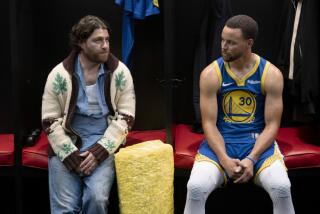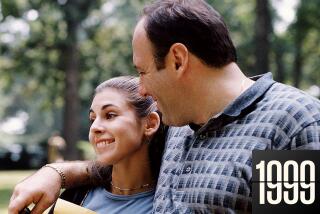Juggling His Yale Life and New Jersey Roots With Flair
- Share via
Tom Perrotta has a wicked sense of the divine. In his able hands, stories that might otherwise seem cliched pull us in before we realize it; characters whom we might otherwise avoid become icons for our veneration.
If Perrotta’s name isn’t familiar, his “Election,” first the book and then the movie, may be more so. It recounted a tried-and-true story of a high school student body election but left in its wake a morality tale about a teacher whose priggish sense of morality collided with a student’s consuming ambition. “Joe College,” his latest book, displays much of the same touch. It’s the story of Danny, a working-class kid who’s trying to make the transition from New Jersey to New Haven with the least possible harm to his sense of self.
Danny is a junior at Yale in 1983, the Yale of Jodie Foster, of not-so-secret societies and singing groups whose members “look like close relatives of [then Vice President] George Bush.” Yet he’s also a citizen of Darwin, N.J., the Darwin of Stop & Shops, Medi-Marts and high school friends who have morphed into police officers and strippers in the three years he’s been gone. While his Yalie classmate Matt is an heir to a General Motors fortune, Danny is the scion of a lunch truck driver; his parents can afford to take him only to a fast-food restaurant when they visit him in New Haven.
It’s a familiar refrain: Working-class boy becomes elite college student and finds himself a stranger both at home and on campus. Yet Perrotta manages to pull this story off with grace by giving texture to the twists and turns of Danny’s life.
The catalyst for the story is the rapid approach of spring vacation, a break that Danny is simultaneously celebrating and dreading. While most Yalies are busy choosing which exotic locales to visit for sun and surf, Danny is facing a week behind the wheel of his dad’s “Roach Coach” while his father recuperates from a long-delayed hemorrhoid surgery. “Just thinking about the lunch truck made my head hurt,” he reflects, comparing it with his friend Polly’s Vermont idyll, complete with swimming hole and “expressive cows.” “I felt the weight of the coin belt around my waist, the dent in my forehead from a too-tight baseball cap, the numbness in my hand from fishing around in the ice bed trying to locate the last can of orange soda.” Learning to play along as a child of privilege is a lot harder for Danny than it is for the topsidered coeds to listen to Springsteen and pretend that they are, as Danny truly is, born to run.
Zigzagging through time and place, Perrotta portrays Danny as barely holding it together. Cindy--the hometown girlfriend he once regarded “more as a potential anecdote, a puzzling and amusing story I would share with my roommates”--has resurfaced, with some not-so-good news; Polly, the co-editor of a student literary journal who is also dating a professor, threatens to become more than just a crush. At home and at school, Danny seeks to avoid the consequences of his actions as much as possible. But he’s angered a rival lunch-truck gang, which has outfitted its trucks with monster tires and is trying to take over the Roach Coach’s route, and he’s rapidly alienating his eccentric suite mates and his dining hall co-workers--an eclectic mix of “townies” and Yalies. Through all of this, Danny is trying to keep his two lives separate--a feat he manages until Cindy shows up at school and Matt arrives for an unexpected spring break in Darwin.
These scenarios tilt ever so slightly, back and forth between sheer believability and utter fantasy in a jumble of characters and conclusions. Indeed, “Joe College’s” neat, almost pat resolution invites comparisons to “Measure for Measure,” the play Danny wrote a paper about in Polly’s boyfriend’s lit class. And that seems intended. The easy if abrupt way that Danny is rescued from major disasters at home and at school seems in keeping with the rest of this novel. Save for the overdone high school remembrances that interrupt the rest of the narrative, “Joe College” succeeds as a fast-paced, fun read.
Like “Election,” “Joe College,” with its flair for dramatic tension and witty repartee, seems ideal for adaptation to a two-hour film. Do yourself a favor; read the book before you see the movie.
More to Read
Sign up for our Book Club newsletter
Get the latest news, events and more from the Los Angeles Times Book Club, and help us get L.A. reading and talking.
You may occasionally receive promotional content from the Los Angeles Times.







